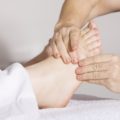The pain caused by an achilles tendon injury presents as a stiffness or burning sensation in your leg. It could be mild or severe, depending on whether your tendon is partly torn or totally raptured. Matthew Hinderland, DPM, a Colorado Springs achilles tendon specialist, can help you manage the discomfort or make a full recovery.
What Is an Achilles Tendon Injury?
The achilles tendon extends from your heel bone to your calf muscles and is the largest tendon in your body. It allows you to stand on your tiptoes, walk, run, and jump. Although anyone can suffer an achilles tendon injury, it is mostly triggered by intense physical activity like jumping or running.
Achilles tendon injuries can manifest in several ways, including achilles tendonitis and achilles tendon tear. Achilles tendonitis is painful tendon inflammation often tied to over-activity. Tendon tear, on the other hand, is a muscle rip or rupture in the tendon caused by trauma.
Both conditions can be debilitating and if not treated early, may require surgery to resolve.
Causes of Achilles Tendon Injuries
Achilles tendon pain is often experienced by athletes or people who work mostly on their feet. It is linked to excessive, intense, and repetitive exercise like jumping or walking. Nonetheless, it may be caused by unrelated infections and conditions like rheumatoid arthritis.
Common causes of achilles tendon injuries include:
- Age: as you grow older, your achilles tendon may weaken and be prone to damage
- Wearing heels for prolonged periods every day
- Forgoing a proper warmup before a workout
- Specific sports like tennis, which require you to male quick stops, slows, or direction changes
- Repeated physical activity or exercise that is strenuous to the calf
- Sudden change or increase in the intensity of physical activity without an adjustment period
- Poorly fitting shoes
- Bone spurs in the back of your heels
Overall, activities that put you at risk of damaging your achilles tendon include running, gymnastics, dancing, and playing football, baseball, volleyball, or basketball.
Symptoms of an Achilles Injury
A pain above your heel when you stand on your toes or stretch your ankles should alert you to tendon damage. The discomfort tends to get worse with time and may vary in severity depending on the type of damage. Your calf muscles may also swell, grow tender, or stiffen.
When your tendon ruptures, you may hear a snapping noise followed by instant severe pain and reduced range of motion in your legs.
Treating Achilles Tendon Pain
The severity of damage will determine the treatment method your doctor recommends. Your pain may go away with home remedies and pain medication or may require injections or surgery.
To increase your chances of recovery, you can make a few adjustments, such as:
- Reducing strenuous physical activity
- Stretching your calf muscles
- Picking a less strenuous sport
- Using heat and cold treatment on the area
- Wearing a brace
You can also go to physical therapy at the advice of your doctor. If the tear is extensive, you may need surgical intervention.
Final Thoughts
Your chances of a quick recovery depend on how early you get help and how carefully you follow your doctor’s instructions. You may achieve full recovery in a few weeks or months.
The moment you feel intense pain in the back of your heel or your calf muscles, call the Foot and Ankle Institute of Colorado office and book an appointment with an Achilles Tendon Specialist.




